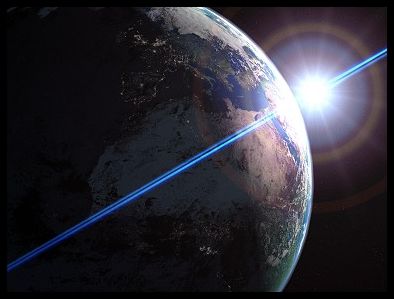
Astronomy 161
An Introduction to Solar System Astronomy
Autumn Quarter 2009
Prof. Scott Gaudi
MTWRF 9:30-10:18am
0100 Mendenhall Laboratory
[Instructor
|
Course Description
|
Syllabus
|
News
|
Lectures
|
Homework
|
Exams
|
Internet Resources
|
Further Reading
|
Copyright Statement
]

Professor: Scott Gaudi
- Office: 4057 McPherson Lab (292-1914)
- Office Hours: Tue, Thur 11:30-12:30, or by appointment
- E-Mail: gaudi.1@osu.edu
TA: Jason Eastman
- Office: 4061 McPherson Lab (292-9242)
- Office Hours: Mon, Wed 2:00-3:00, or by appointment
- E-Mail: eastman.37@osu.edu
Astronomy 161 is an introduction to modern astronomy, with an emphasis
on the solar system. We will begin with an exploration of the
historical development of astronomy to trace the path by which we have
come to our present understanding of the Universe, building up along
the way the basic toolkit of physical concepts that we will need for
our later discussions. The second half of the course will be devoted
to an overview of modern solar system astronomy, with particular
attention paid to the constituents of the solar system, comparative
planetology (structure, surfaces, & atmospheres) and the history and
evolution of the solar system.
- The Class Syllabus is available online. It
may also be downloaded in PDF Format [110kb]
Final grades have been posted. Please email me
or stop by my office if you would like your score on your final exam. Have a great winter break!
The links below lead to outlines of the lectures. These are intended to
provide a guide to the subjects that will be covered during class and
are by no means transcripts of the lectures.
I strongly encourage class attendance, as not all of the essential class
material will appear on these web pages or in the text.
I will try to make the outlines available before class, although
this will not always be possible.
There will be four homework assignments during the quarter. Homework will
be handed out on Monday and due the following Monday.
Homework Schedule
Answers to the homework questions.
There will be three quizzes during the quarter in addition to the final.
The three quizzes and the final are closed-book and closed-notes.
You only need to bring a #2 pencil to these exams.
Quiz Schedule:
- Quiz 1: Friday, October 16 [Results]
- Quiz 2: Thursday, November 5 [Results]
- Quiz 3: Monday, November 30 [Outline of Topics] [Results]
Final Exam:
The final exam will be on Tuesday, December 8 from 9:30-11:18am in 0100 Mendenhall Laboratory [Study Guide]
- Lecture Outlines
- Planetarium and Roof Night Schedule
- Prof. Richard Pogge's Selected Astronomical Internet Links for further exploration
Some Astronomy Picture Sites:
- Astronomy Picture of the Day
- NASA Planetary Photojournal
A great collection of planetary images at JPL.
- Latest pictures from the Saturn system
returned by the Cassini spacecraft.
- Latest pictures from the Mars Exploration Rovers Spirit and Opportunity.
- Latest pictures from the Hubble Space Telescope
- Pictures from the Chandra X-ray Observatory
- Pictures from the Spitzer Space Telescope
-
- Courtesy of Sky & Telescope Magazine
Below is compiled a list of books that expand on the material
covered in the course for those interested in further reading.
These books are not required, or even recommended, for this course.
They are listed here purely for the benefit of students interested
in exploring some of the topics from class in further detail on their
own.
- The Discoverers: A History of Man's Search to Know His World and Himself by Daniel J. Boorstin
- This book, by the late Librarian of Congress, is an excellent overview
of how human discovery and invention have shaped history. I drew many
historical anecdotes from this book to supplement the lectures, including
those on time, the calendar, and other aspects of the history of science.
- Longitude: The True Story of a Lone Genius Who Solved the Greatest Scientific Problem of His Time by Dava Sobel
- An excellent and very readable account of John Harrison's invention
of a precise, compact chronometer to solve a centuries-old scientific
problem. The work of many great scientific minds on the longitude problem
are well placed in this historical context.
- The Book Nobody Read by Owen Gingerich
- A narrative of the author's search to track down all remaining copies of
Copernicus' De Revolutionibus, along with an engaging description
of the Copernican Revolution and the dawn of modern astronomy.
All of the written materials provided in these web pages are
copyrighted by the course instructor, except
as noted. In addition, some images and animations are also copyrighted
by the instructor, while others are copyrighted by the original sources.
Please read the Copyright Statement before you
make copies of any of these web pages for any purpose. Use of these notes
implies that you have read and understood the copyright statement.
The image at the top of this page is from NASA.
Updated: 2007 March 14
Copyright © Scott Gaudi All Rights
Reserved.

